
7 minutes
PRESIDENTIAL ELECTION IN SOCIAL MEDIA - MOLDOVA 2020
Final report
Between 1 September and 13 November 2020, in cooperation with Mediapoint, we monitored how politicians and parties used Facebook, Instagram, YouTube and TikTok in the context of the November 1 and 15, 2020 presidential election in Moldova.
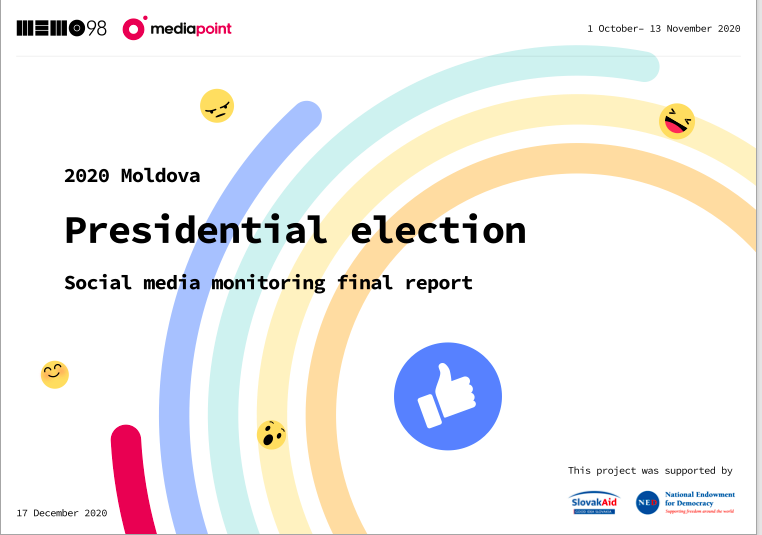
#Introduction
The main purpose of the monitoring was to determine the impact that social networks have on the electoral process and the extent to which they serve as a platform for providing important information to voters. We also aimed to analyze the way in which citizens interacted with the posts of politicians and political parties. While for most people, television remains the main source of information about politics, the rapid increase in the number of social media users inspired us to monitor the use of Facebook and Instagram during the elections in the Republic of Moldova. Other social media platforms, such as YouTube and TikTok, were also monitored.
The monitoring also focused on topics and issues discussed online, in the context of the elections, on Facebook and Instagram pages of political parties and politicians. In general, we wanted to assess the role of social media platforms in elections and their potential impact on electoral integrity, in particular, the level of public confidence in this process. In the run-off, we focused on the two candidates who polled the highest number of votes in the first round, Maia Sandu and Igor Dodon.
The monitoring was possible thanks to the support from the SlovakAid (Slovak Agency for International Development Cooperation) and the National Endowment for Democracy.
#Findings
Candidates who participated in the first round of elections and monitored political parties posted 2,646 posts on Facebook and 290 on Instagram. These posts generated 2,535,669 interactions. Prior to the run-off, the two candidates posted 180 on both Facebook and Instagram, and these posts generated 640,696 interactions.
In general, Facebook was more used by politicians and parties than Instagram. Only five presidential candidates used their Instagram account as a campaign tool, while no political party relied on this platform to actively promote its candidate. The number of interactions generated on Facebook was 12 times higher than on Instagram.
Prior to the first round, the most active party on Facebook was Nostru Nostru, with 433 posts, and the most active candidate was Renato Usatii, with 353 posts. During the election campaign, the number of interactions on the pages of monitored candidates was about 8 times higher than on the pages of monitored parties.
Renato Usatii was the most popular candidate on Facebook by the number of interactions, while the most popular party was the Action and Solidarity Party.
The most frequently mentioned topics by the number of posts were “Roads and infrastructure”, “Union with Romania”, “Salaries and Pensions”. The COVID-19 pandemic was only the fifth most focused topic. In this context, it is important to mention that this election campaign took place in the context of the alarming increase in the number of COVID-19 cases in the Republic of Moldova.
Posts about topics “Salaries and Pensions”, “Education” and “Corruption” generated the highest number of interactions on Facebook.
Posts about the problems of the judiciary system, as well as those related to pensions and salaries were the most commented. Posts about the judiciary system generated the most negative emotions on Facebook.
Prior to the first round, 71% of the total interactions generated on the monitored Facebook pages were accumulated by two candidates - Maia Sandu and Renato Usatii.
In general, Youtube was not widely used as a campaign tool during the 2020 elections. Prior to the first rounds, only two out of eight candidates posted videos on their YouTube channels. Prior to the run-off, YouTube was used more intensively to spread false information.
Registered candidates and parties spent about 40,616 euros for advertising on Facebook and Instagram between August 4 and October 29, 2020. Prior to the second round, Maia Sandu and Igor Dodon spent 11,896 euros on paid political advertising on Facebook.
There was a total of 3,549 sponsored posts about social issues, elections or politics posted on Facebook and Instagram, with a total value of 63,590 euros or approximately 1.27 million lei, between August 4 and October 29.
Prior to the first round, among presidential candidates, Renato Usatii spent the most money on advertising on social issues, elections, and politics, starting from 4 August. At the same time, Dorin Chirtoaca was the only candidate who did not use a single euro for promotion on Facebook and Instagram, according to Facebook Ads Library.
During the electoral campaign, Maia Sandu gathered 130 times more new fans on Facebook than Igor Dodon (38,684 vs. 298).
Chisinau, Balti, and Ungheni were the top three cities where most advertisements on social issues, elections, or politics were targeted.
Igor Dodon and Maia Sandu increased the impact of their posts on social networks in 2020. Igor Dodon managed to increase about 10 times the number of interactions with his posts, compared to the 2016 campaign. Maia Sandu's posts had 90,000 interactions more than in 2016.
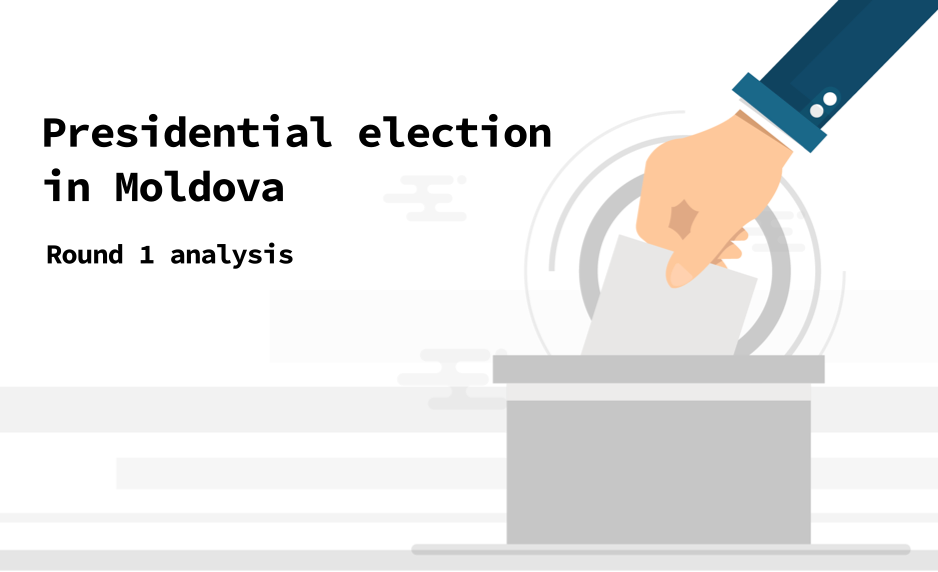
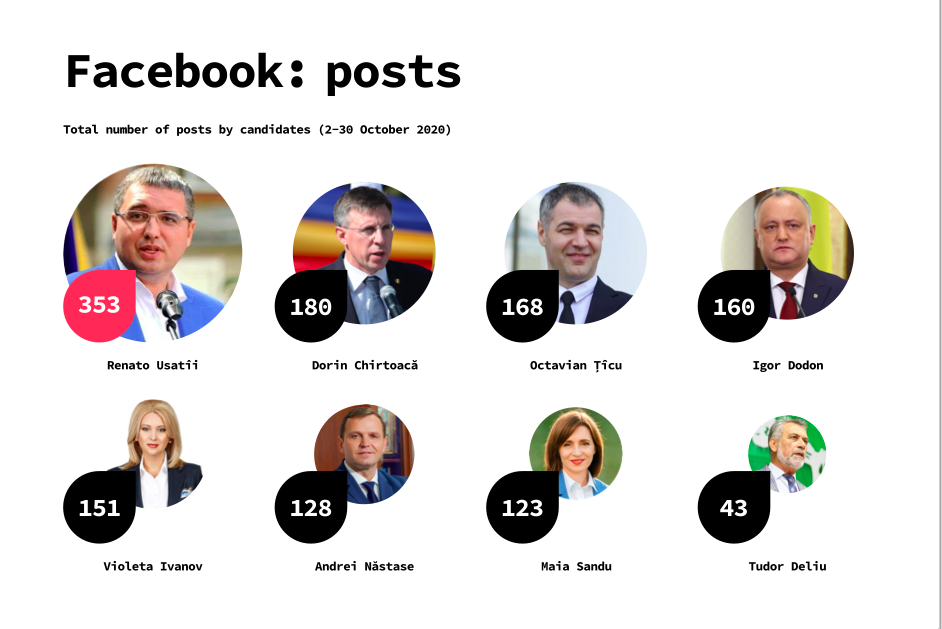
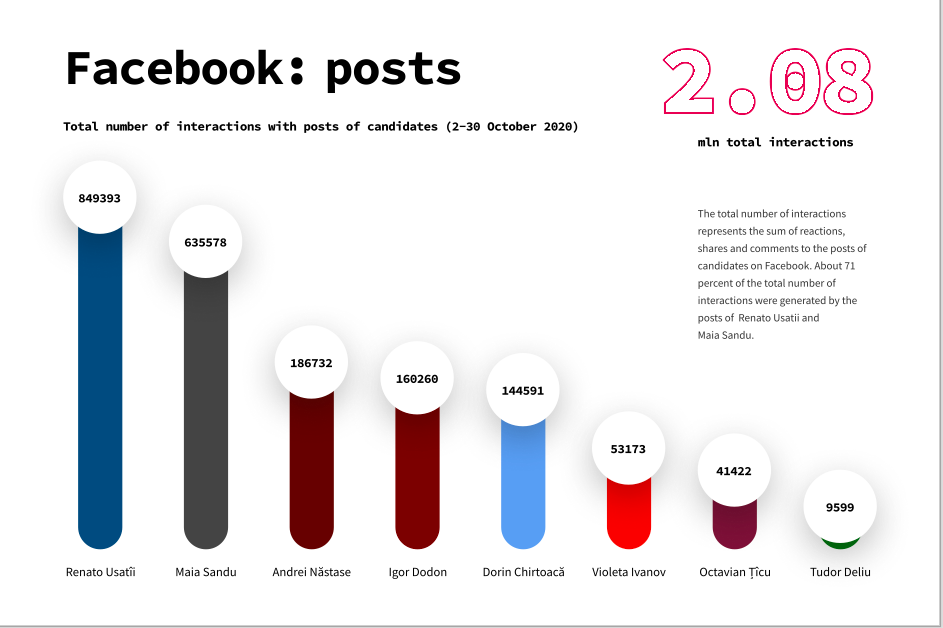
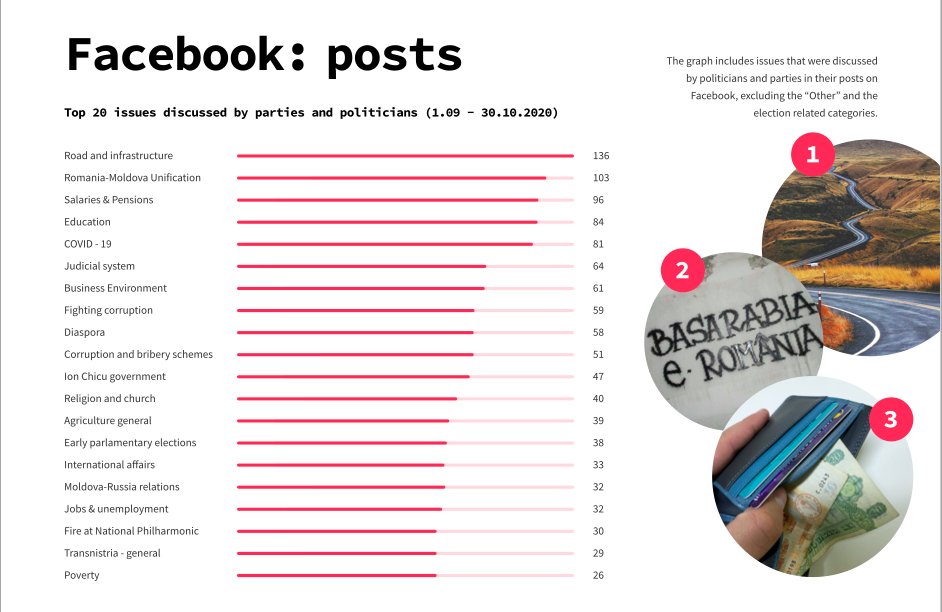
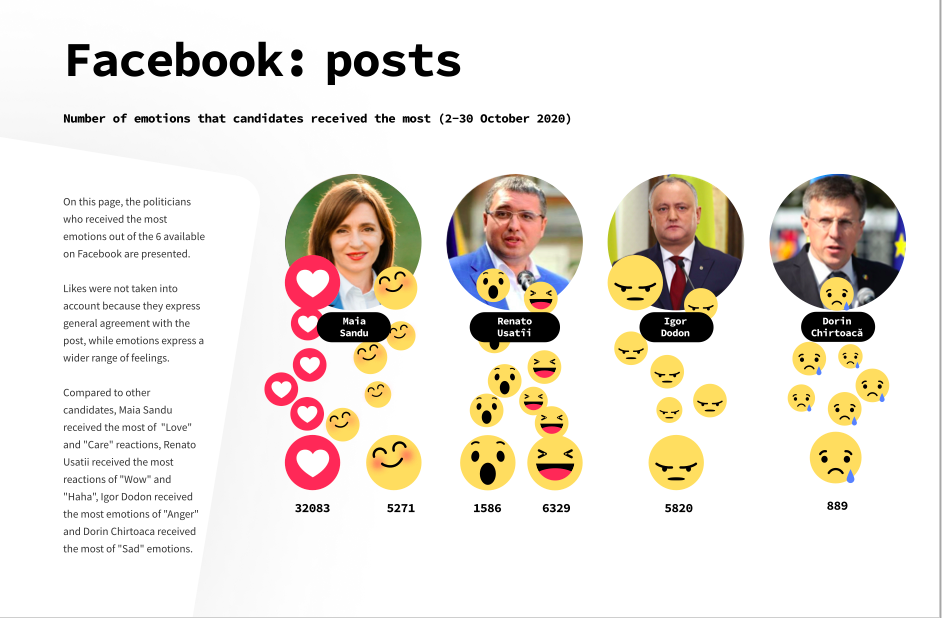

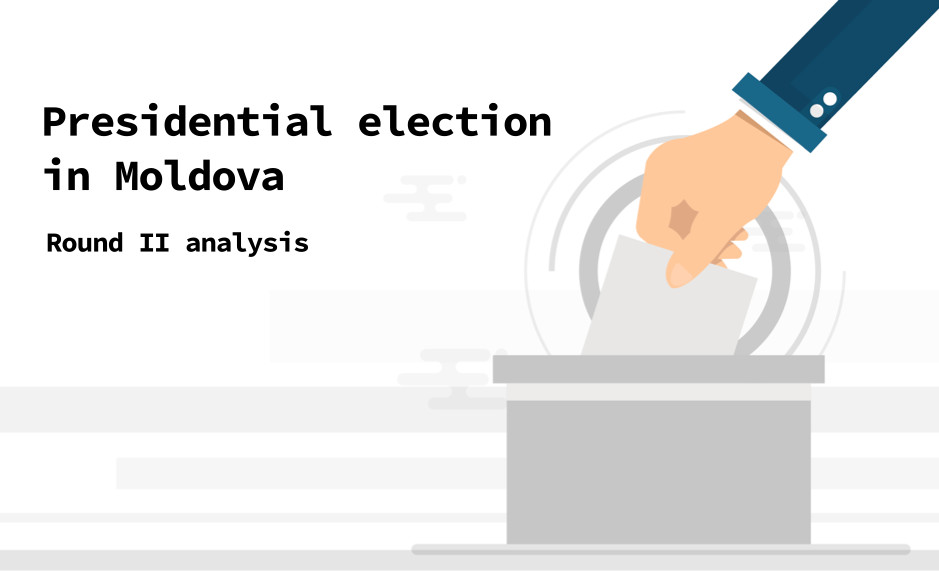


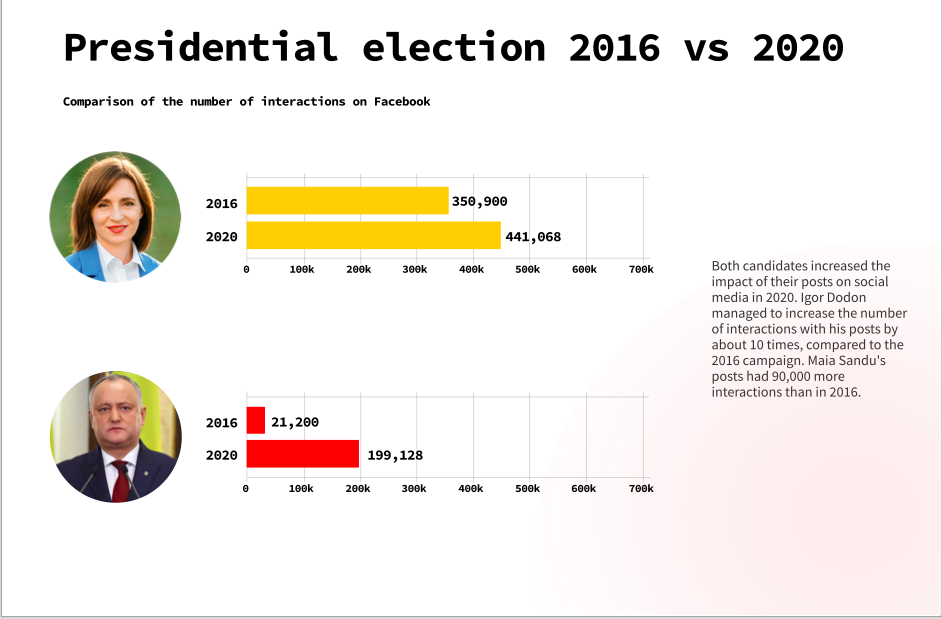
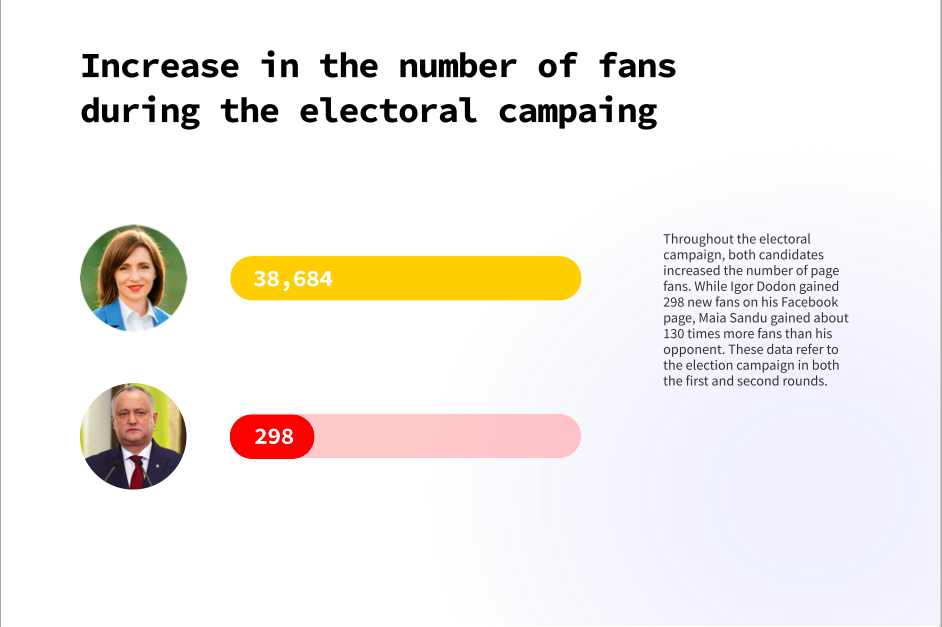
#Recommendations
A negative and denigrating discourse towards the candidates was present in this election campaign, whether it came directly from the candidates or from their colleagues. To limit the impact of negative discourse on the integrity of elections, the Code on the conduct and reflection of the election campaign could contain a section dedicated to the use of social networks by signatories.
The new rules introduced by the Facebook platform on sponsored posts have helped reduce misinformation on this network. In the future, other digital platforms should also provide such a mechanism to reduce the placement of sponsored posts by unauthorized users.
Tech companies (such as Google, Youtube, Twitter) should also do their utmost to improve the transparency of online political advertising and to respond promptly to any content that violates their standards or relevant national legislation.
Development of partnerships between public authorities, civil society and IT experts who together would promote digital literacy and media programs in schools but also for the general population.
There is a need to strengthen the capacity of civil society organizations to monitor the use of online space during the electoral campaign. Also, a joint effort of local monitors would contribute to a deeper understanding of the social media impact on election integrity and provide a mechanism for responding to emerging threats.
The full report can be found here